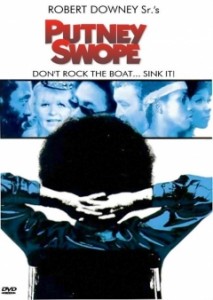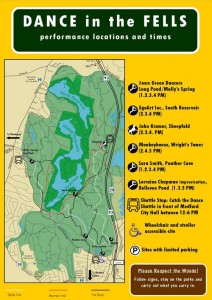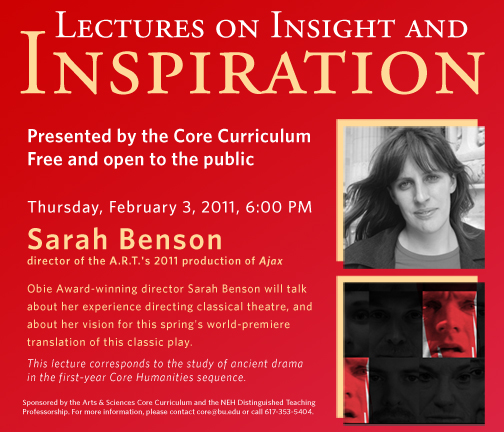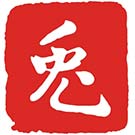February 8, 2011 at 5:52 pm

The faculty in Core Social Sciences have introduced an exciting new version of CC204 (second-semester Social Sciences) on the theme of “Inequality.” Prof. Thornton Lockwood provided the following description of the course:
Over the last two years, major changes have been going on with the second semester of Core Social Sciences. In the fall semester of 2009, the faculty decided that the social sciences should take on a thematic unity—more specifically, a thematic focus on all the ways that contemporary social science examines inequality. The new CC204 was rolled out in Spring 2010, a course focused especially on inequality in global development and on the bases of class, race, gender, and nation states. Based on student feedback, the Core faculty then devoted the summer of 2010 to further tweaking the readings and streamlining the lecture structure. The result is a highly polished course which incorporates twentieth-century social science classics such as W.E.B. Du Bois’ The Souls of Black Folks (1903), Simone de Beauvoir’s The Second Sex (1949), Franz Fanon’s The Wretched of the Earth (1963) and Stephen J. Gould’s The Mismeasure of Man (1981), as well as twenty-first century, cutting-edge research on education, inequality in two-income families, color-blind racism, and the geopolitical effects of European colonialism.
A PDF version of the new CC204 syllabus can be found here. Feel free to compare to syllabi from previous semesters: Spring 2010, 2009, 2008, 2007, 2006. The list of required texts for the current semester can be found on the Core books page. In coming weeks on the Core blog, faculty and students will be contributing further thoughts on the curricular changes in CC204, and reflecting on their experience teaching and exploring this new wealth of intellectual material. Stay tuned!
By CAS Core Curriculum
|
Posted in Academics, Curriculum
|
Tagged CC204, Curriculum, faculty, Inequality, social sciences
|
February 8, 2011 at 12:20 pm
A man is rich in proportion to the number of things which he can afford to let alone.
-- Henry David Thoreau, in "Where I Lived and What I Lived For" from Walden, which book students will be reading this spring in CC202: From the Enlightenment to Modernity.
By CAS Core Curriculum
|
Posted in Analects
|
Tagged Analects, CC202, Thoreau, Walden
|
February 7, 2011 at 1:04 pm

Night followed day in swift succession. On earth at that time a day lasted for only five or six hours. The planet spun madly on its axis. The moon hung heavy and threatening in the sky, far closer, and so looking much bigger, than today. Stars rarely shone, for the atmosphere was full of smog and dust, but spectacular shooting stars regularly threaded the night sky. The sun, when it could be seen at all through the dull red smog, was watery and weak, lacking the vigour of its prime. Humans could not survive here. Our eyes would not bulge and burst, as they may on mars; but our lungs could find no breath of oxygen. We'd fight for a desperate minute, and asphyxiate.
The earth was named badly. 'Sea' would have been better. Even today, oceans cover two-thirds of our planet, dominating views from space. Back then, the earth was virtually all water, with a few small volcanic islands poking through the turbulent waves. In thrall to that looming moon, the tides were colossal, ranging perhaps hundreds of feet. Impacts of asteroids and comets were less common than they had been earlier, when the largest of them flung off the moon; but even in this period of relative tranquility, the oceans regularly boiled and churned. From underneath, too, they seethed. The crust was riddled with cracks, magma welled and coiled, and volcanoes made the underworld a constant presence. It was a world out of equilibrium, a world of restless activity, a feverish infant of a planet.
It was a world on which life emerged, 3,800 million years ago, perhaps animated by something of the restlessness of the planet itself. We know because a few grains of rock from that bygone age have survived the restless aeons to this very day. Inside them are trapped the tiniest specks of carbon, which bear in their atomic composition the nearly unmistakable imprint of life itself.
[from Chapter 1, pages 8-9, of Life Ascending: The Ten Great Inventions of Evolution, by Nick Lane, a book now studied in CC106: Biodiversity]
By CAS Core Curriculum
|
Posted in Analects
|
Tagged Analects, biology, cells, evolution CC106
|
February 7, 2011 at 12:24 pm
Lectures this week:
CC102: Prof. Michael on Lao Tzu and the Tao Te Ching (2/8)
CC106: Prof. Mohr on, How does diversity arise at the DNA level? (2/8)
CC106: Prof. Mohr on DNA diversity impacting the functional diversity of proteins (2/10)
CC202: Prof. Schwartz on Goethe's Faust (2/8)
CC204: Prof. Stone on racial inequality in the 21st century (2/10)
Notes
Lots to do this week in Core!
- Tonight. Join the Core Journal! The first meeting for students interested in becoming contributors or staff editors of the 2011 Core journal will be at 5 PM in CAS 119.
- Tuesday, February 8. Film Series screening of the Buddhist film Spring, Summer, Fall, Winter... Spring. Dinner at 6 PM, film at 6:15 PM. CAS 224.
- Wednesday, February 9. Profs. Wood and Formichelli will bring students to the MFA to view the Fresh Ink exhibit and the new American Wing. Sign up in CAS 119 and make sure to bring your BU ID. Meet in the Core office to leave by 5 PM.
- Thursday, February 10. Prof. Sullivan has arranged a film screening of Putney Swope for the students of CC204. Pizza at 6; film at 6:30; in CAS room 424.
- Friday, February 11. Prof.s Hamill and Formichelli will take students to the Frog Pond at Boston Common to go skating. Dress warm, and bring $5 if you need skate rentals. Meet at 4 PM in CAS 119, sign up in advance. Hot chocolate to follow! (Rescheduled from last week).
- Saturday, February 12 or Sunday, February 13. Core goes to the ART to see Sophocles' Ajax. Choose a night and sign up for a ticket in CAS 119. $5. Show begins at 7:30 PM. Pick up your ticket at the ART box office before the show, 64 Brattle Street, Cambridge. Harvard Stop on the Red line.
- Sunday, February 13. Excerpts from Mozart's Don Giovanni at Jordan Hall. Open to all students. 3 PM. $5. Tickets in CAS 119.
Get connected with Core!
Check out our blog | Follow us on Facebook | Twitter
Make sure to bookmark the Core calendar.
Do you have any ideas, or comments about Core activities? Email Prof. Kyna Hamill.
By CAS Core Curriculum
|
Posted in e-bulletin
|
Tagged e-bulletin
|
February 7, 2011 at 12:12 pm
 Mr. Victrola Cola: I got this great window cleaner. Cleans good and doesn't streak. Smells bad, though. Cleans good, but smells bad.
Mr. Victrola Cola: I got this great window cleaner. Cleans good and doesn't streak. Smells bad, though. Cleans good, but smells bad.
Putney Swope: As a window cleaner, forget it. Put soybeans in it and market it as a soft drink in the ghetto. We'll put a picture of a rhythm and blues singer on the front and call it Victrola Cola.
This snippet of dialogue comes from the 1969 satirical film Putney Swope, as does the title of this post, another quote from the title character. In the film, the only black man on the executive board of an advertising firm -- Putney Swope -- is put in charge after the unexpected death of the chairman of the board. When voting for the replacement of the chairman, each board member votes for the person he thought no one else would vote for: Swope. Renaming the business "Truth and Soul, Inc.", the new chairman replaces all but one of the white employees, and insists they no longer accept business from companies that produce alcohol, war toys, or tobacco. The success of the business draws unwanted attention from the government, which considers it "a threat to the national security." Through comic satire, the film criticizes and plays with black militant rhetoric, the portrayal of race in Hollywood films, the white power structure, and nature of corruption in any struggle for power.
This film is being screened for the students of CC204, this Thursday February 10th at 6 PM in CAS 424, to complement their study of race and inequality in that course.
By CAS Core Curriculum
|
Posted in Announcements, Events, Uncategorized
|
Tagged CC204, film, Inequality, race, satire
|
February 7, 2011 at 11:45 am
 Congratulations to Prof. Kyna Hamill, whose performance company Two Roads just received a Gold Star Award from the Massachusetts Cultural Council for their two-day, site-specific project Dance in the Fells, for being considered one of the best locally funded projects of the year. From the MCC website:
Congratulations to Prof. Kyna Hamill, whose performance company Two Roads just received a Gold Star Award from the Massachusetts Cultural Council for their two-day, site-specific project Dance in the Fells, for being considered one of the best locally funded projects of the year. From the MCC website:
The MCC's Gold Star Awards, established in 2001, recognize exemplary cultural programs funded by local cultural councils (LCCs) throughout the state. These projects celebrate diversity, foster collaboration, showcase artistic excellence, and provide learning experiences for people of all ages and backgrounds.
Read more about Dance in the Fells at Inside Medford.
By CAS Core Curriculum
|
Posted in Uncategorized
|
Tagged awards, dance, faculty
|
February 4, 2011 at 12:04 pm
Mitochondria are a silly place to store genes. They are often glibly called the powerhouses of the cell, but the parallel is quite exact. Mitochondrial membranes generate an electric charge, operating across a few millionths of a millimetre, with the same voltage as a bolt of lightning, a thousand times more powerful than domestic writing. To store genes here is like depositing the most precious books of the British Library in a dodgy nuclear power station.
-- Nick Lane, in his discussion of the evolution of cellular complexity, page 109, in Life Ascending: The Ten Great Inventions of Evolution, a book now studied in CC106: Biodiversity
By CAS Core Curriculum
|
Posted in Analects
|
Tagged Analects, biology, CC106, cells, evolution
|
February 3, 2011 at 2:03 pm
The American Repertory Theater is putting up a production of Sophocles' Ajax this month, a world-premiere of this particular translation. This evening, Obie Award-winning director Sarah Benson will speak about her experience directing classical Greek plays professionally, and about her work on the upcoming production. This event is part of the Core-sponsored series of lectures on "Insight and Inspiration."
Benson's talk will begin at 6 PM, in the BU Castle at 225 Bay State Road, followed by a Q&A and refreshments. Free and open to the public.

By CAS Core Curriculum
|
Posted in Events
|
Tagged Ajax, CC102, drama, Events, Sophocles, theater
|
February 3, 2011 at 1:18 pm
 In the coming weeks, you're going to see more posts from Core lecturers and faculty here on the Core blog, as we find ways to share part of the Core classroom experience with you readers. Prof. Eckel invited Prof. Wiebke Denecke -- who lectured this past Tuesday on Confucius for the students of CC102 -- to muse for a moment on the significance of Confucius in China today. She accepted the invitation, and had this to say:
In the coming weeks, you're going to see more posts from Core lecturers and faculty here on the Core blog, as we find ways to share part of the Core classroom experience with you readers. Prof. Eckel invited Prof. Wiebke Denecke -- who lectured this past Tuesday on Confucius for the students of CC102 -- to muse for a moment on the significance of Confucius in China today. She accepted the invitation, and had this to say:
On his recent visit to the United States, Chinese Premier Hu Jintao visited a Confucius Institute in Chicago. (Photographs from his visit can be found at the website of the Confucius Institute Online). As the government of China seeks to spread its influence through a kind of "soft power" around the world, Confucius has become a symbol of Chinese cultural identity. After Confucius fell so decisively out of fashion during the Cultural Revolution (1966-76), this is a stunning reversal. But maybe we should not be surprised that the ancient Master should have something powerful to say to the contemporary world, since the relevance of antiquity was so much a part of his own message.
In any case, the spirit of Confucius continues to live in the Core Curriculum: "The Master said, I for my part am not one of those who have innate knowledge. I am simply one who loves the past and is diligent in investigating it" (Analect 7.19).
The Chinese character at the top of this post means "rabbit" or "hare," and is used as a symbol of the Rabbit in the Chinese zodiac. Today, February 3, 2011, is celebrated as New Year's Day in the Chinese lunisolar calendar. On this holiday, people wish each other success by saying, "Wishing you to be prosperous [in the New Year!]" -- gong xi fa cai ("gong she fa chai") in Mandarin, or gong hei fat choi ("gong hey fat choy") in Cantonese. Don't forget to ask for your red envelope filled with good luck money...
By CAS Core Curriculum
|
Posted in Core Lecturers
|
Tagged Analects, CC102, China, Confucius, Denecke, lecturers
|
February 3, 2011 at 1:16 pm
The current RA of the Core House has a brief message for any and all returning Core students:
Hello all!
I hope you are surviving the snow! I just wanted to let you know that if you are interested in living in the Core House next year, you have to complete an application for Specialty Housing by Friday, February 11. The form is available here, complete with further instructions.
-Holly
The Core house is a wonderful place to live, just outside of the center of campus on the edge of South Campus (full disclosure: I lived there for two years myself). It can be a fun and bustling intellectual community that all returning sophomores should consider as a housing option. Feel free to email Holly at hcnicely@bu.edu with any questions.
By CAS Core Curriculum
|
Posted in Announcements
|
Tagged Core House
|






